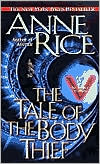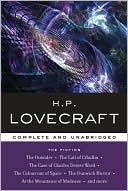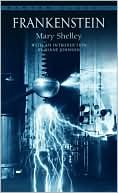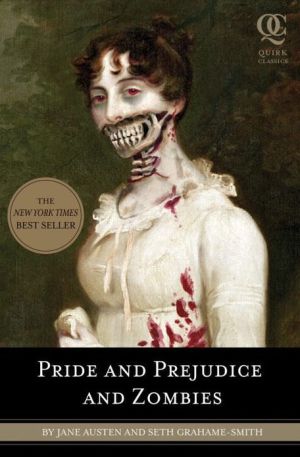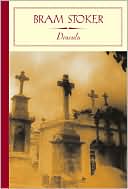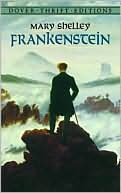The Tale of the Body Thief (Vampire Chronicles Series #4)
"A wonderfully mesmerizing adventure, delving into the convoluted mind of one of modern fiction's most famous anti-heroes, the vampire Lestat. Rice's writing is elegant and thought-provoking and her story is a gem."\ THE SAN DIEGO UNION-TRIBUNE\ For centuries Lestat has been a courted prince in the universe of the dead. Now he is alone and everything he once believed in seems false. So he embarks on a dangerous journey to destroy his doubts and loneliness forever....
Search in google:
In another feat of hypnotic storytelling, Anne Rice continues the extraordinary Vampire Chronicles that began with the now classic Interview with the Vampire and continued with The Vampire Lestat and The Queen of the Damned. Lestat speaks. Vampire-hero, enchanter, seducer of mortals. For centuries he has been a courted prince in the dark and flourishing universe of the living dead. Lestat is alone. And suddenly all his vampire rationale--everything he has come to believe and feel safe with--is called into question. In his overwhelming need to destroy his doubts and his loneliness, Lestat embarks on the most dangerous enterprise he has undertaken in all the danger-haunted years of his long existence.The Tale of the Body Thief is told with the unique--and mesmerizing--passion, power, color, and invention that distinguish the novels of Anne Rice.Publishers WeeklyThe fourth book of the Vampire Chronicles series, launched in 1976 with Interview with the Vampire (which Knopf is simultaneously reissuing in cloth), reconfirms Rice's power as a mesmerizing raconteur. In sensuous, fluid prose, she follows the tormented vampire Lestat as he struggles to integrate his bloodthirsty nature with his aspirations to achieve humanity. Desiring to see the sun, to love without taking blood, to seek God as mortals do, Lestat enters blindly into an unholy bargain. In order to experience mortality for one day and two nights, he agrees to switch bodies with the scoundrel Raglan James, a former member of the secret order of scholarly occultists called the Talamasca, and a ``sinister being,'' according to David Talbot, the order's superior general and Lestat's longtime friend and advisor. But Lestat has given little thought to how James intends to use his body and its vampiric powers. Trapped in the mortal state, Lestat must overcome the human frailties of despair and physical pain to thwart James's evil intentions and, with Talbot's help, regain his immortal self. Drawing on characters met in earlier novels as well as the lushly evoked settings of New Orleans, Miami and Paris, Rice once again deftly lures readers into the enchanting world of her anguished and deeply sympathetic hero.
MIAMI—the vampires' city. This is South Beach at sunset, in the luxurious warmth of the winterless winter, clean and thriving and drenched in electric light, the gentle breeze moving in from the placid sea, across the dark margin of cream-colored sand, to cool the smooth broad pavements full of happy mortal children.\ Sweet the parade of fashionable young men displaying their cultured muscles with touching vulgarity, of young women so proud of their streamlined and seemingly sexless modern limbs, amid the soft urgent roar of traffic and human voices.\ Old stucco hostelries, once the middling shelters of the aged, were now reborn in smart pastel colors, sporting their new names in elegant neon script. Candles flickered on the white-draped tables of the open-porch restaurants. Big shiny American cars pushed their way slowly along the avenue, as drivers and passengers viewed the dazzling human parade, lazy pedestrians here and there blocking the thoroughfare.\ On the distant horizon the great white clouds were mountains beneath a roofless and star-filled heaven. Ah, it never failed to take my breath away—this southern sky filled with azure light and drowsy relentless movement.\ To the north rose the towers of new Miami Beach in all their splendor. To the south and to the west, the dazzling steel skyscrapers of the downtown city with its high roaring freeways and busy cruise-ship docks. Small pleasure boats sped along the sparkling waters of the myriad urban canals.\ In the quiet immaculate gardens of Coral Gables, countless lamps illuminated the handsome sprawling villas with their red-tiled roofs, and swimming pools shimmering with turquoise light. Ghost walked in the grand and darkened rooms of the Biltmore. The massive mangrove trees threw out their primitive limbs to cover the broad and carefully tended streets.\ In Coconut Grove, the international shoppers thronged the luxurious hotels and fashionable malls. Couples embraced on the high balconies of their glass-walled condominiums, silhouettes gazing out over the serene waters of the bay. Cars sped along the busy roads past the ever-dancing palms and delicate rain trees, past the squat concrete mansions draped with red and purple bougainvillea, behind their fancy iron gates.\ All of this is Miami, city of water, city of speed, city of tropical flowers, city of enormous skies. It is for Miami, more than any other place, that I periodically leave my New Orleans home. The men and women of many nations and different colors live in the great dense neighborhoods of Miami. One hears Yiddish, Hebrew, the languages of Spain, of Haiti, the dialects and accents of Latin America, of the deep south of this nation and of the far north. There is menace beneath the shining surface of Miami, there is desperation and a throbbing greed; there is the deep steady pulse of a great capital—the low grinding energy, the endless risk.\ It's never really dark in Miami. It's never really quiet.\ It is the perfect city for the vampire; and it never fails to yield to me a mortal killer—some twisted, sinister morsel who will give up to me a dozen of his own murders as I drain his memory banks and his blood.\ But tonight it was the Big-Game Hunt, the unseasonal Easter feast after a Lent of starvation—the pursuit of one of those splendid human trophies whose gruesome modus operandi reads for pages in the computer files of mortal law enforcement agencies, a being anointed in his anonymity with a flashy name by the worshipful press: "Back Street Strangler."\ I lust after such killers!\ What luck for me that such a celebrity had surfaced in my favorite city. What luck that he has struck six times in these very streets—slayer of the old and the infirm, who have come in such numbers to live out their remaining days in these warm climes. Ah, I would have crossed a continent to snap him up, but he is here waiting for me. To his dark history, detailed by no less than twenty criminologists, and easily purloined by me through the computer in my New Orleans lair, I have secretly added the crucial elements—his name and mortal habitation.\ A simple trick for a dark god who can read minds. Through his blood-soaked dreams I found him . And tonight the pleasure will be mind of finishing his illustrious career in a dark cruel embrace, without a scintilla of moral illumination.\ Ah, Miami. The perfect place for this little Passion Play.\ I always come back to Miami, the way I come back to New Orleans. And I'm the only immortal now who hunts this glorious corner of the Savage Garden, for as you have seen, the others long ago deserted the coven house here—unable to endure each other's company any more than I can endure them.\ But so much the better to have Miami all to myself.\ I stood at the front windows of the rooms I maintained in the swanky little Park Central Hotel on Ocean Drive, every now and then letting my preternatural hearing sweep the chambers around me in which the rich tourists enjoyed that premium brand of solitude—complete privacy only steps from the flashy street—my Champs Elysees of the moment, my Via Veneto.\ My strangler was almost ready to move from the realm of him spasmodic and fragmentary visions into the land of literal death. Ah, time to dress for the man of my dreams.\ Picking from the usual wilderness of freshly opened cardboard boxes, suitcases, and trunks, I chose a suit of gray velvet, an old favorite, especially when the fabric is thick, with only a subtle luster. Not very likely for these warm nights, I had to admit, but then I don't feel hot and cold the way humans do. And the coat was slim with narrow lapels, very spare and rather like a hacking jacket with its fitted waist, or, more to the point, like the graceful old frock coats of earlier times. We immortals forever fancy old-fashioned garments, garments that remind us of the century in which we were Born to Darkness. Sometimes you can gauge the true age of an immortal simply by the cut of his clothes.\ With me, it's also a matter of texture. The eighteenth century was so shiny! I can't bear to be without a little luster. And this handsome coat suited me perfectly with the plain tight velvet pants. As for the white silk shirt, it was a cloth so soft you could ball the garment in the palm of your hand. Why should I wear anything else so close to my indestructible and curiously sensitive skin? Then the boots. Ah, they look like all my fine shoes of late. Their soles are immaculate, for they so seldom touch the mother earth.\ My hair I shook loose into the usual thick mane of glowing yellow shoulder-length waves. What would I look like to mortals? I honestly don't know. I covered up my blue eyes, as always, with black glasses, lest their radiance mesmerize and entrance at random—a real nuisance—and over my delicate white hands, with their telltale glassy fingernails, I drew the usual pair of soft gray leather gloves.\ Ah, a bit of oily brown camouflage for the skin. I smoothed the lotion over my cheekbones, over the bit of neck and chest that was bare.\ I inspected the finished product in the mirror. Still irresistible. No wonder I'd been such a smash in my brief career as a rock singer. And I've always been a howling success as a vampire. Thank the gods I hadn't become invisible in my airy wandering, a vagabond floating far above the clouds, light as a cinder on the wind. I felt like weeping when I thought of it.\ The Big-Game Hunt always brought me back to the actual.\ Track him, wait for him, catch him just at the moment that he would bring death to his next victim, and take him slowly, painfully, feasting upon his wickedness as you do it, glimpsing through the filthy lens of his soul all his earlier victims—\ Please understand, there is no nobility in this. I don't believe that rescuing one poor mortal from such a fiend can conceivably save my soul. I have taken life too often—unless one believes that the power of one good deed is infinite. I don't know whether or not I believe that. What I do believe is this: The evil of one murder is infinite, and my guilt is like my beauty—eternal. I cannot be forgiven, for there is no one to forgive me for all I've done.
\ Publishers Weekly - Publisher's Weekly\ The fourth book of the Vampire Chronicles series, launched in 1976 with Interview with the Vampire (which Knopf is simultaneously reissuing in cloth), reconfirms Rice's power as a mesmerizing raconteur. In sensuous, fluid prose, she follows the tormented vampire Lestat as he struggles to integrate his bloodthirsty nature with his aspirations to achieve humanity. Desiring to see the sun, to love without taking blood, to seek God as mortals do, Lestat enters blindly into an unholy bargain. In order to experience mortality for one day and two nights, he agrees to switch bodies with the scoundrel Raglan James, a former member of the secret order of scholarly occultists called the Talamasca, and a ``sinister being,'' according to David Talbot, the order's superior general and Lestat's longtime friend and advisor. But Lestat has given little thought to how James intends to use his body and its vampiric powers. Trapped in the mortal state, Lestat must overcome the human frailties of despair and physical pain to thwart James's evil intentions and, with Talbot's help, regain his immortal self. Drawing on characters met in earlier novels as well as the lushly evoked settings of New Orleans, Miami and Paris, Rice once again deftly lures readers into the enchanting world of her anguished and deeply sympathetic hero.\ \ \ \ \ Library JournalThis fourth book of the ``The Vampire Chronicles'' is by far the weakest. The plot involves everybody's favorite blood drinker, Lestat de Lioncourt, who foolishly strikes a bargain with sinister sorcerer Raglan James for a brief exchange of bodies; the soul of each vacates its respective flesh and slips into that of the other. Once befanged, James welshes on the deal, so Lestat, aided by David Talbot, Superior General of the Talamasca (a sort of CIA of the supernatural) must pursue and evict him from the immortal coil. The characters' body swapping could have made fun reading, but rather than using the vampire powers to truly seize the night, Rice has James merely dance with old ladies on the QE2 and rob wall safes. Lestat in human form contracts pneumonia, adopts a stray dog, and has safe sex with a nun. In between, there are doses of homoerotica and much silly talk on the nature of God, the soul, and good and evil. Though Rice's popularity demands its purchase, this book has little sound and less fury that signify next to nothing. A real disappointment. Previewed in Prepub Alert, LJ 6/1/92; BOMC main selection.-- Michael Rogers\ \ \ Stuart WhitwellRice loves the vampire Lestat de Lioncourt--loves his reckless will, his untamable thirst for life's power, his immortal vigor, and his unaging physical beauty. Equally, she seems to love the erotic longing that makes each taste of blood fill his body so completely with the obliterating ecstasy of life's own pulse--as if for that moment, life and death were coupling in her soul even as they are coupling in his. There is no doubt that Rice's greatest gift is for rendering a possibly perverse but powerful eroticism in new and unexpected forms; at her best she is a shameless disciple of Masoch and de Sade, as when Lestat couples (as only a vampire can) with his beautiful but dying mother and restores her to life. As for the remythologizing of vampire legend that took up the better part of The Vampire Lestat and The Queen of the Damned, it is--despite its brilliance--mercifully over in The Tale of the Body Thief. But so, sadly--or at least kept at bay--is the near-pornographic eroticism that rippled with such haunting menace through Interview with a Vampire and the early part of Lestat. If only The Tale of the Body Thief had a little more lusty throat-piercing, it might have been the most perfect of the four tales, for certainly it has a coherent plot (a problem for Rice) and captures vividly Lestat's almost Zarathustrian will-to-power, tested here when he is tricked into returning to mortality by a con-man playing on his nostalgia for the sensuality of life. Here again are David Talbot, Louis, and the ghost of Claudia. But the few other characters in the novel are new, as is the idea of the body thief, who can swap his soul with another's. Yet it is only in the last few, cruel pages that Rice really takes off. It was this we were waiting for--the Lestat that repels and seduces us, for whose blood we, too, would lay bare our throats! Rice has a number of faults, in short, but the dark saga of her imagination seems continually to surmount them.\ \ \ \ \ Kirkus ReviewsRice fans awaiting the finale of 1990's The Witching Hour will be only temporarily dismayed by the author's fourth bloodletting and the return of the Vampire Lestat—in what is Rice's most strongly plotted novel yet. Lestat first appeared in the cloth-of-purple-velvet Interview With the Vampire (1976), the first modern novel to take up vampirism on a scale of detail whose seriousness sowed the dragon's teeth of imitators. Here, Lestat holds the storyteller's reins and tells of his recent folly in attempting to return to mortality. He despairs of his present 200 years of life, then goes to the Gobi desert to commit suicide by flying into the sun. But death by sunlight is too painful to bear. So when he is approached by Raglen James—a con artist who has been kicked out of the secret psychic organization The Talamasca, good guys with a computerized record of all major evil events caused by nasty spirits, and who has learned the trick of body switching—Lestat is fatally seduced into switching bodies with James for two nights and a day. This is a third of the waffling way into a novel that is slow to set its hook. But once Rice gets to the body switch, she provides her most inspired pages ever. Sweet-smelling, cruel, proud, self-pitying, death-proof, snotty, multimulti-billionaire honcho vampire Lestat finds himself in the tall, handsome body of a man who bears every human frailty, suffers proneness to a killer cold that lands him in the hospital, has mortal fears by the dozen, synapses much slower than Lestat's, sloshy flesh that twists with hunger, always feels leaden, and must descend to the horrid stinks of the toilet. He's robbed blind by James, a greathacker thief, and falls in love with a Catholic nun—while James, on a blood-flying rampage, won't give Lestat his body back. Irresistible as Steve Martin and Lily Tomlin's All of Me. \ \
